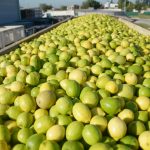Rains put further strain on Argentine lemon season

An agricultural expert in the northern Argentine province of Tucumán says recent rains have aggravated the socioeconomic problems related to a range of crops, including citrus, soybeans, maize and sugarcane. 
Obispo Colombres Agro-industrial Research Station (EEAOC) technical director Daniel Ploper tells www.freshfruitportal.com the combined effects of winter frosts and a spring drought cut the lemon crop in half.
However, it should be noted industry forecasts imply a greater absorption of volume losses in the domestic market, as the country's lemon exports are only expected to fall by 27%.
Ploper is hopeful the weather will improve so harvests can be more stable. He emphasizes that with the right agronomic practices the volume shouldn't be too badly affected; just delayed.
"To start with there's the lower production of lemons, 50% less, but also these rains have been very unusual, especially those in the last days of April and in the first couple of weeks in May - this has meant that the lemon harvest has not been able to regularize," Ploper says.
"They started a bit, but practically they had to stop because you can't pick fruit in those conditions. All you do is increase rotting by harvesting in the wet, causing more physical damage to the fruit.
"I calculate it'll just be a delay though. Considering there isn't much fruit the impact shouldn't be so big, as the fruit won't stockpile...if you don't touch the fruit, it shouldn’t have mold on arrival and be sent back."
However, the nature of other crops means they could receive more damage than citrus fruit.
"In the case of crops like soybeans, if you have a field and it rains, there is a deterioration in the grains and a loss of yield," he says, adding this follows drought years in 2011-12 and 2012-13.
"This last campaign, 2013-14, had a very bad start at the end of spring and the start of summer. After that it was composed and something improved, but they also didn't reach the normal production levels in the case of grains.
"Also what has been affected in the last two years, almost three years, has been the price of sugar, which is the main agroindustrial product in Tucuman, even more than lemons."
He says the weather issues create "socioeconomic" problems across these crops, as they not only affects businesspeople and growers, but workers and their families.
"The workers that make up the labor force, they are the main ones affected. The provincial government, in collaboration with the national government, has given economic support to the workers with a minimal figure."
He says for many seasonal workers, the circumstances mean they effectively lose half their year of employment, and their options to turn to other regions in Argentina are limited.
"This is a very complicated situation, and is also so for the growers because they have to maintain a plantation with all the crop practices, phytosanitary applications, along with all the expenditures that come with it and taxes. If you don't have an income, logically you're going to be very affected.
Photo: www.shutterstock.com















































